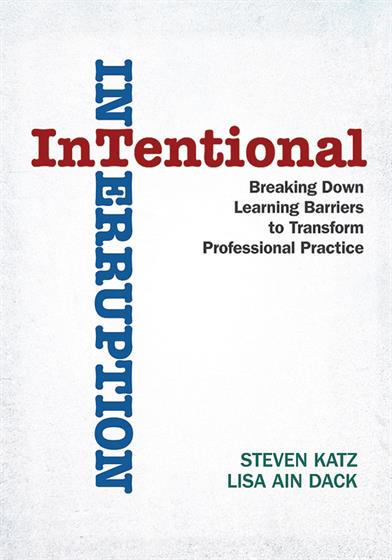Description
We interrupt this program to bring meaningful, conceptual change to your team's professional learning!
If you're involved in professional learning, you know that big ideas can sometimes get stuck on the way to becoming real change. Steven Katz and Lisa Ain Dack explain the secret to getting unstuck: interrupting the status quo of traditional activity-based professional development to help educators embrace permanent changes in thinking and behavior. They outline a process—grounded in psychological research—for real professional learning that ultimately leads to improved student achievement.
You can enable true learning by
- Building a focus on learning, collaborative inquiry, and formal and informal instructional leadership in schools
- Recognizing the psychological processes involved in adult learning, and overcoming the psychological biases and barriers to change
- Using tools and strategies such as critical friend relationships, learning conversations, task sheets, and protocols
Illustrated with concrete, school-based examples drawn from real practice, Intentional Interruption shows how rethinking professional learning can lead to the development of a real and sustainable learning culture in your school.
"Few books challenge your thinking of a field to this degree. The authors reveal the secret key to unlocking true professional learning and thus impact for students."
—Terry Morganti-Fisher, Consultant
Learning Forward
"Before your learning team goes much further, it needs to stop, read, and collectively reflect on these insights. This book will identify those sticky challenges and how you can optimize your joint work."
—Mag Gardner, Superintendent of Student Achievement
Hamilton-Wentworth District School Board, ON
Key features
Features and Benefits
- Based on an empirically validated theory of action focused on how real, new professional learning leads to changes in practice, and ultimately, to improved student achievement.
- Describes how to "enable" true knowledge creation by building three key capacities: a learning focus, collaborative inquiry that challenges thinking and practice, and formal and informal instructional leadership.
- Explains the psychological processes involved in learning, noting why and how we typically avoid the precursor to real new learning – conceptual change.
- Offers a range of tools and strategies for facilitating real learning – or to put it differently, for intentionally interrupting the habits of mind and practice that support the status quo and impede conceptual change—including critical friend relationships, learning conversations, task sheets, and protocols.
- Shows how to embed and sustain a true learning culture in schools by examining key psychological tenets that support the ongoing cycle of inquiry that makes real, new learning (conceptual change) possible, including the motivation requirements for cultivating change, the critical role of "effort" and "deliberate practice", and "metacognitive regulation" – as a habit of mind and practice – for achieving results.



